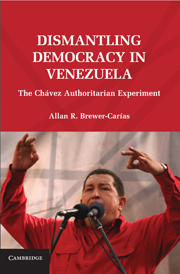Book contents
- Frontmatter
- Contents
- AUTHOR'S NOTE
- INTRODUCTION DEFRAUDING DEMOCRACY THROUGH NONCONSENSUAL CONSTITUENT ASSEMBLIES
- PART ONE THE POLITICAL ASSAULT ON STATE POWERS AND THE FRAMEWORK FOR AUTHORITARIANISM
- PART TWO INSTITUTIONAL DEVELOPMENT TOWARD CONSOLIDATING AUTHORITARIANISM
- PART THREE CONSTITUTIONAL REFORMS DESIGNED TO CONSOLIDATE AUTHORITARIANISM
- INDEX
PART ONE - THE POLITICAL ASSAULT ON STATE POWERS AND THE FRAMEWORK FOR AUTHORITARIANISM
Published online by Cambridge University Press: 05 June 2012
- Frontmatter
- Contents
- AUTHOR'S NOTE
- INTRODUCTION DEFRAUDING DEMOCRACY THROUGH NONCONSENSUAL CONSTITUENT ASSEMBLIES
- PART ONE THE POLITICAL ASSAULT ON STATE POWERS AND THE FRAMEWORK FOR AUTHORITARIANISM
- PART TWO INSTITUTIONAL DEVELOPMENT TOWARD CONSOLIDATING AUTHORITARIANISM
- PART THREE CONSTITUTIONAL REFORMS DESIGNED TO CONSOLIDATE AUTHORITARIANISM
- INDEX
Summary
The main trend of the Venezuelan experience of dismantling democracy from within is that the process, aimed to replace representative democracy with “participatory democracy,” used democratic tools but defrauded democracy itself, and using constitutional mechanisms it also defrauded the Constitution. The result has been a political assault on state powers by a new resentful political group that was formed; nonetheless, profiting from the democratic rules during Venezuela's four decades of stable democracy. That group has destroyed the traditional parties, all democratic institutions, and any sort of pluralism seeking to implement a socialist model for which the people did not vote.
The process began in 1999 with the convening of the Constituent Assembly not authorized in the 1961 Constitution. That assembly allowed a resentful political class to take over all branches of government and completely reshape the Constitution (Chapter 1). In addition, to facilitate the dismantling of democracy, after popular approval of the Constitution and before its publication, without any authority to do so, the Constituent Assembly sanctioned the Transitory Constitutional Regime, which allowed many provisions of the Constitution not to be applied and split provisions into two categories: those approved by the people and others not submitted to popular approval (Chapter 2). The result of this constitution-making process was a new Constitution that formally reaffirmed all the democratic values constructed during the previous decades but sowed the seeds for the reinforcement of centralization (Chapter 3) and state intervention in the social and economic life (Chapter 4), allowing the dismantling and destruction of democracy by the elected governments.
- Type
- Chapter
- Information
- Dismantling Democracy in VenezuelaThe Chávez Authoritarian Experiment, pp. 33 - 34Publisher: Cambridge University PressPrint publication year: 2010



